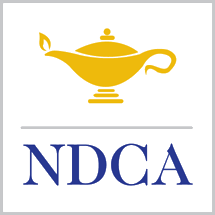Adam Torson made and Chris Theis seconded the following motion, which passed 7-0 on 5/11/2017.
The NDCA Lincoln-Douglas tournament procedures should be amended by replacing this section of the Tournament Qualification section:
"The debater with the highest point total using this qualification system plus points earned at the NDCA National Championships will be awarded the Dukes and Bailey Cup. The NDCA National Championships will be treated as a maximum points earning tournament. The winner of the Dukes and Bailey Cup must compete in the NDCA National Championships.
with this:
"The debater competing in the NDCA National Championships with the highest point total prior to the start of the NDCA National Championships will be awarded the Dukes and Bailey Cup."
AND
the Tournament Qualification section of the Policy debate tournament procedures should be amended by replacing this part:
"The team with the highest point total using this qualification system that attends the NDCA Championships will be awarded The David P. Baker Award for Season Long Excellence. The NDCA National Championships tournament will count toward winning the Baker and will be the last tournament at which points can be earned. To be considered for this award a team must have debated together at all five tournaments used for qualification."
with
"The team competing in the NDCA National .Championships with the highest point total prior to the start of the NDCA National Championships will be awarded The David P. Baker Award for Season Long Excellence. To be considered for this award a team must have debated together at all five tournaments used for qualification."
AND
the following section should be added to the NDCA Public Forum National Championship procedures:
Section: Award for Season Long Excellence
The NDCA should award the:
"Award for Season Long Excellence in Public Forum Debate"
The winner of the award should be the Public Forum team competing in the NDCA National Championships that has earned the most points prior to the start of the NDCA National Championshipos using the following formula:
The number of teams attending the tournament (up to 120 teams) X Diversity of Tournament Multiplier (below) X Elimination Success Multiplier (below) X your preliminary round win percentage = TOTAL POINTS EARNED FROM THE TOURNAMENT.
Diversity of Tournament Multiplier (DTM):
1-2 states: 1.0
3-5 states: 1.2
6-8 states: 1.4
9-12 states: 1.6
13-15 states: 1.8
16 or more states: 2.0
Elimination Success Multiplier (ESM):
Didn’t clear: 1
Clearing but not winning an elimination round: 1.1
Octas: 1.2 (winning at least one elimination round)
Quarters: 1.4 (winning at least one elimination round)
Semis: 1.6 (winning at least one elimination round)
Finals: 1.8 (winning at least one elimination round)
Winning Finals: 2.3
Every elimination round from octafinals on is worth a bonus after the number of participants in elimination rounds is less than or equal to half the number of entries. For example, a tournament with 15 entries doesn't count for a bonus until semifinals. A tournament with 16 entries would count beginning with quarterfinals. A team must win an elimination round to get bonus points beyond clearing. For example, if a tournament breaks to semifinals and a team loses in semifinals the multiplier is 1.1.
Example: In 2005, Grapevine had 72 teams representing six states. Six states is a Diversity of Tournament Multiplier (DTM) of 1.4. If a team is 4-1 in prelims their prelim win percentage is .8, winning an octas debate and losing in quarters gives them a 1.4 Elimination Success Multiplier (ESM). So if a team was 4-1 in prelims and lost in the quarterfinals at Grapevine their points would be: 72 X 1.4 X 1.2 X .8 = 96.768
A team counts their best five tournament performances in the varsity/open division of virtually any tournament using the appropriate NSDA resolution. A team may accrue points competing in the varsity/open division of any tournament occurring prior to the NDCA National Championships that has at least twice as many entries as preliminary rounds. For example, a tournament with 6 preliminary rounds must have at least 12 entries to become a tournament that can count towards qualification. Tournaments such as round robins that utilize an even number of judges for preliminary competition are not eligible.
